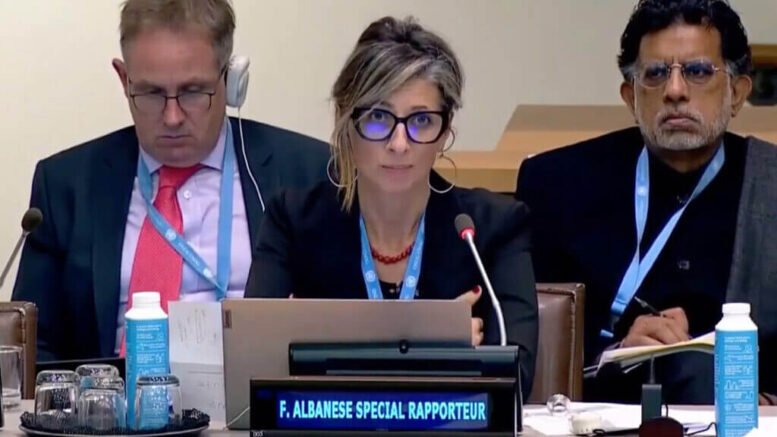U.S. Sanctions UN Special Rapporteur Francesca Albanese Over ICC Engagement

On July 9, the United States Secretary of State Marco Rubio announced sanctions on Francesca Paola Albanese, the UN Human Rights Council’s Special Rapporteur on the situation of human rights in the Palestinian territories occupied since 1967 under Executive Order 14203. The U.S. justified this action as a response to Albanese’s alleged collaboration with the International Criminal Court (ICC) in targeting U.S. and Israeli nationals, an act the U.S. considers a violation of both its own and Israel’s sovereignty, given that neither country is a signatory to the Rome Statute.
The U.S. government has cited what it describes as longstanding bias, including antisemitic remarks and hostility toward the U.S. and its allies. It also criticizes her recommendation that the ICC issue arrest warrants for Israeli Prime Minister Benjamin Netanyahu and former Defense Minister Yoav Gallant, and her recent letters to global companies urging ICC investigations, which the U.S. characterizes as unfounded and potentially harmful to national interests, leading the U.S. to deem her unfit for service as a Special Rapporteur.
That same day, Albanese criticized Italy, France, and Greece, States Parties to the ICC, for violating their legal obligations by allowing Israeli President Benjamin Netanyahu to use their airspace, instead of arresting and surrendering him as required under the Rome Statute. The sanctions against Albanese are part of a broader effort by the U.S. and Israel to restrict independent investigations into Israel’s actions in Gaza. The sanctions follow earlier U.S. measures against ICC Prosecutor Karim Khan and several ICC judges in 2025.
UN Spokesperson Stéphane Dujarric warned that imposing sanctions on Special Rapporteurs sets a dangerous precedent, stating that “the use of unilateral sanctions against Special Rapporteurs or any other UN expert or official is unacceptable.” He emphasized that while Member States have every right to express their views and disagree with the experts' reports, such actions must respect UN processes.
These concerns were echoed by UN High Commissioner for Human Rights Volker Türk, who advised Member States to respond constructively, even in cases of strong disagreement. He called for the “prompt reversal” of the sanctions imposed on the Human Rights Council-appointed Special Rapporteur, stressing that she was carrying out duties assigned under her official mandate.
ICJ Middle East and North Africa Programme Director, Saïd Benarbia, noted that if the sanctions against Albanese remain in place without being challenged, they could have a chilling effect that poses an existential threat to the mandates of all UN Special Procedures and to the broader UN human rights system. He emphasized that the integrity of the international legal order depends on allowing ICC judges, prosecutors, and UN Special Procedures to carry out their duties independently and without fear of retaliation.
Liz Evenson, international justice director at Human Rights Watch, stated that the U.S. government’s decision is ultimately aimed at silencing a UN expert for carrying out her mandate. She argued that the U.S. is undermining the institutions survivors of serious abuses rely on. Evenson called on UN and ICC member states to firmly oppose the U.S. government’s efforts to obstruct accountability for grave international crimes and to denounce the sanctions imposed on Albanese as outrageous.
The U.S. sanctions on Francesca Albanese reflect a broader effort to shield its allies, particularly Israel, from international legal scrutiny it views as politically motivated. By targeting UN and ICC officials, the U.S. risks setting a precedent that could undermine the impartiality and credibility of global institutions commissioned with investigating serious human rights abuses.

